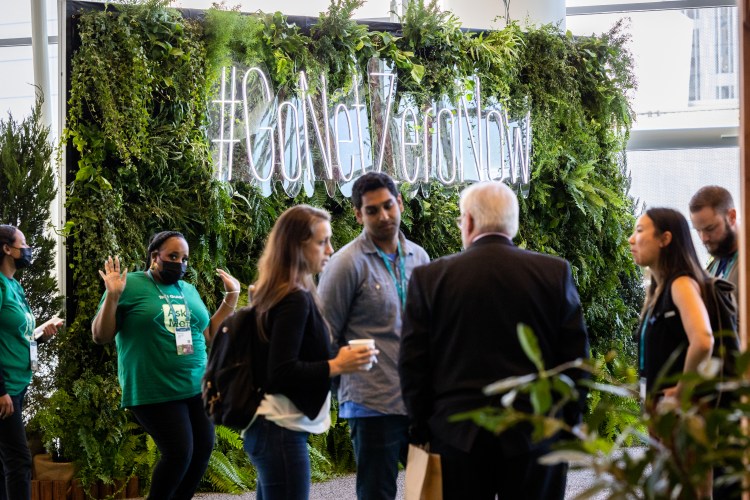Sustainability is Strategic: Key Learnings for Business Leaders



We brought together Net Zero Cloud users for a two-day conference on the state of sustainability — here's what we learned.
Worldwide, sustainability teams are being asked to do more with less. As budgets shrink and regulations shift, the demand to prove business value has never been higher.
Fortunately, there are two clear opportunities for sustainability teams to do so: unlocking operational efficiencies and reducing risk for their company. During Net Zero Cloud’s User Conference on June 3-4, the need to make sustainability strategic was a major theme.
Here’s what we learned:
- Sustainability must be linked to business value
- Focus on actionable insights and strategy
- Build trust through auditable reporting
From sustainability data to business value
Discover practical tips for achieving sustainability goals while boosting business resilience.



1. Sustainability must be linked to business value
Given the shifting landscape in the world of sustainability, leaders need to re-position their function as a value-driving engine for their company rather than a cost center. But reaching that point isn’t easy.
Sustainability teams must evolve their data collection, analysis, and reporting capabilities. For most teams, this evolution is a journey rather than a seismic shift. Each stage of this journey builds upon the last, unlocking new capabilities that are essential for transforming the sustainability function into a strategic business partner.
The journey typically follows the steps listed below:
- Data foundation: Without high-quality data, accurate reporting and strategic action are impossible. Overcoming the initial challenge of sourcing and integrating data from across the company is a critical first step.
- Accounting and reporting: When teams reach this stage, they are able to take inventory of their company’s emissions and fulfill reporting needs. This transforms raw sustainability data into a clear baseline for companies.
- Action and reduction: During this stage, teams take action by reducing emissions over which they have direct control, allowing them to showcase their impact within the organization and build momentum. These emissions are referred to as scope 1 and scope 2 emissions.
- Supplier engagement: By stage four, companies are able to move beyond the emissions they directly control and use their sustainability data to track emissions from suppliers and leverage their influence to reduce them. Indirect emissions, or scope 3 emissions, account for the vast majority of emissions produced by an organization. Reducing them is critical for meaningful, long-term impact.
- Sustainable operations: In the final stage of the journey, sustainability data isn’t siloed. It’s used across functions, from product development to finance and operations, providing leaders with a 360-degree view of their company data. When companies reach this stage, sustainability creates business value. Sustainability data is used to identify risks and reduce operational costs while keeping the company on track to meet its emissions targets.
2. Focus on actionable insights and strategy
So, what happens when sustainability data is available across the business? It shifts the sustainability function away from being a reporter of historical data to a strategic pillar of the business.
During the conference, several customers shared how they paired sustainability data from Net Zero Cloud with operational and third-party data to build powerful predictive models. One customer mentioned they use data from Net Zero Cloud when evaluating planned and potential projects. This allows the company to not only forecast the return on investment for the project, but also whether it slows or hastens progress toward their emissions targets.
The ability to combine sustainability data with other company data is critical. Needs differ from organization to organization. To account for these differences, companies must build their own models using their own data rather than relying on a one-size-fits-all approach to modeling.
Get sustainability insights faster with Agentforce
Get real-time, actionable insights to drive sustainability goals with confidence.



3. Build trust through auditable reporting
While the primary focus of the conference was the transformation of sustainability leaders from reporters to strategists, reporting remains a top concern. The global regulatory environment is fluid, so it’s wise to keep up with best practices.
Unsurprisingly, auditable reporting was top of mind for attendees. Two key principles emerged from the conference:
- Store evidence for every quoted figure: Know your data inside and out, and have evidence for every number listed in your reports.
- Document your methodological decisions: Be sure to document the “why” behind every methodological decision your team makes as you formulate your disclosures.
These principles highlight the inherent limitations of manual spreadsheets. Investing in sustainability software directly addresses these challenges by creating a single source of truth, where evidence can be attached to every data point and methodological decisions can be documented and traced in a fully auditable system.
Beyond reporting, reliable data equates to more powerful insights, predictive forecasting, and effective spending.
The future is integrated: weaving sustainability into the fabric of business
The Chief Sustainability Officer role seemingly grows more complex by the day. Business leaders expect sustainability teams to uncover areas of cost savings, mitigate risk, and deliver strategic insights. As challenging as this shift in expectations has been for many teams, it’s also presenting a rare opportunity for them to re-position sustainability as a key pillar of their business.
It starts by ending the siloing of sustainability data. Managers across the enterprise should be able to easily access insights into insights such as energy and water consumption and use it to inform decision-making. Net Zero Cloud makes this possible.
Learn more by booking a Net Zero Cloud demo today.
Sustainability, simplified.



Disclaimer: AI supported the writers and editors who created this article.





















